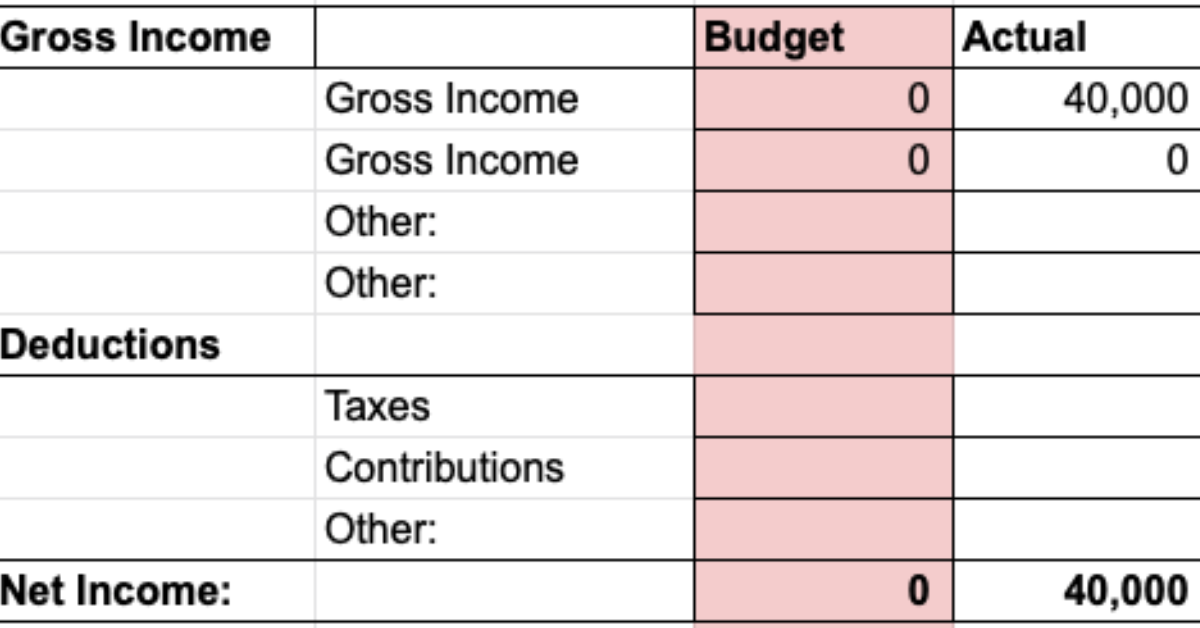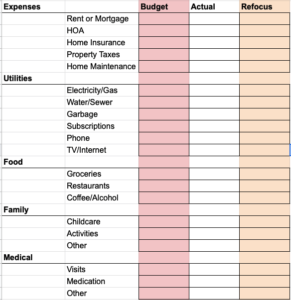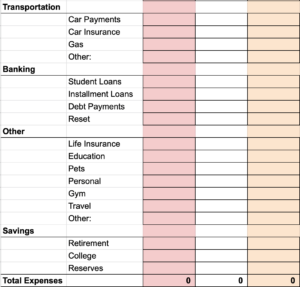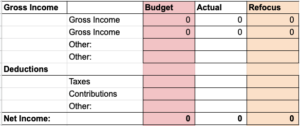How to budget on an entry level salary

Are you struggling to budget on an entry-level salary? Many people may find it difficult to adjust to living on entry-level pay. Even if you may not make a lot of money when you first start a career or fresh out of college, you can still advance financially.
However, there are some things you can do to make it easier. Here are eight pieces of advice for budgeting on an entry-level salary.
1. Track your spending
There are different ways that you can track your spending each month.
One way is to keep all your receipts and then add up the total at the end of the month. Doing this can be a bit time-consuming, but it will give you a good overview of where your money is going.
Another way to track your spending is to use a budgeting app or software. Budgeting apps are a great option to see your spending in real-time and track it over time.
A few top-rated budgeting apps include,
Finally, another option is to set up a system where you only use cash for certain expenses. This can help you easily track your monthly spending, and limit yourself to a certain amount each month.
Whichever method you choose, keeping track of your spending helps you stay on budget.
2. Prioritize your spending
If you are just beginning your career, you may not have much money to spend. That doesn’t mean that you can’t live a comfortable life. With little planning, you can prioritize your spending and ensure that your hard-earned money goes where it will do the most good.
An easier way to do this is to follow the 50/30/20 budgeting method.
- 50% for needs
- 30% for wants
- 20% for savings
50% of your income gets put towards your needs or essential expenses (rent, food, transportation, etc.).
30% of your income goes to things you want. For example, you might want to set aside money for fun activities like eating out or seeing a movie. Make sure to give yourself a realistic amount of money for this.
Finally, you should be saving money for emergencies. Saving about 20% is a typical amount of money for someone just starting.
Of course, every person’s income and budget are different. You may need to adjust these numbers to fit your actual situation. By taking the time to figure out your priorities, you can ensure that your spending aligns with your values and helps you achieve your goals.
3. Create a realistic budget
Don’t try to live off ramen noodles and PB&J sandwiches – you’ll only end up miserable. Assure that your budget includes money for fun activities and treats so you don’t feel like you’re depriving yourself.
If you are following the first two tips, then you should be on the right track to creating a realistic budget! However, here is a little extra help.
- The first step is to look closely at your income and expenses. Make a list of your regular bills, including rent, utilities, loan- payments, and credit card payments.
- Then, add up your other regular expenses, such as groceries, gas, and entertainment.
- Once you have a list of your regular bills and expenses, you can start to figure out how much money you have left over each month. This leftover money can be set aside for future goals or to cover unexpected expenses.
Your budget worksheet should look a little like this,
List your Income:
List your expenses:


Honesty is the key to a successful budget. If you know that your spending habits lean towards over-spending, then this must be factored in when creating one!
Otherwise, you will likely find yourself falling short each month. By being honest about your spending habits and factoring them into your budget, you can create a realistic budget that will help you stay on track financially.
4. Save, save, save
In the current economy, it’s more important than ever to start saving money as soon as you can. With wages staying stagnant and living costs rising each year by an average of 3%, many people find themselves in difficult financial situations that they may not be able to solve without assistance from family members or friends with deep pockets (or both).
However, there are a few simple steps that young adults can take to start building their savings.
- Invest in a good savings account. Look for an account with low fees and a high-interest rate. Finding a good savings account will help you grow your savings more quickly.
- Make a budget and stick to it. Track your spending for a few months in order to know where your money is going. Then, create a budget that allocates funds for savings each month.
- Automate your savings. Set up automatic transfers from your checking account to your savings account each payday. This way, you’ll never even see the money and you’ll be less tempted to spend it.
- Cut back on expenses. Take a close look at your spending and see where you can cut back. For example, you might need to eat out less often or forego that new wardrobe purchase.
- Find creative ways to make extra money. If you have some free time,
Consider taking advantage of any employer match programs. Your company might offer 401(k) matching. It’s crucial that your contributions are in order to get the total amount from them! Be on the top alert as well – there will always be promotions or deals going around where saving takes center stage and overspending.
5. Pay your debts
Landing your first job out of college can be a huge relief. You finally have a steady income and can start paying off your debts. For many people, the transition from college to the real world is difficult.
But if you’re like most new grads, you’re probably also dealing with student loans. And if you’re living in an expensive city, you may find that your entry-level salary doesn’t go very far. If you’re in this situation, it can be tempting to make the minimum payments on your debts and hope that things will get better down the road. However, there are a few reasons to show why this is not a good idea.
For one thing, interest rates on student loans are usually high, which means you’ll end up paying more in the long run if you only make minimum payments.
Additionally, making timely payments on your debts is essential for maintaining a good credit score. So even though it may be difficult, it’s important to try to chip away at your debts as much as possible. By doing so, you’ll be in a better financial position both now and in the future.
Here are a few tips to help you pay your debts,
- One option is to get creative with your budgeting. If you’re paying for rent, transportation, and other essentials, there may not be a lot of wiggle room in your budget. But if you take a close look at your spending, you may be able to find some areas where you can cut back. For example, if you’re eating out more often than not or spending money on unnecessary luxuries, consider scaling back to free up more cash flow for debt payments.
- Another option is to look for ways to boost your income. If you have extra time, you could pick up a part-time job or start freelancing. Or, if you’re struggling to make ends meet, you could consider getting a roommate or moving to a less expensive area.
Paying off your debts can be challenging, but it can help you become financially free in the long run.
6. Invest in yourself
Self-investment is often portrayed as pure selfishness- pursuing your own interests at the expense of others.
However, there is more to it than that. Sure, investing in yourself means taking care of your own needs and wants. But it also means making choices that will benefit you in the long run, even if they are strenuous in the short term.
It means saying no to things that will derail your goals and yes to help you reach them. It means being honest with yourself about your strengths and weaknesses, and taking steps to improve upon the latter.
In short, self-investment is about choosing to do what is best for you – not just in the moment, but in the future as well. And while it may sometimes be difficult, it is always worth it. After all, you are the only one who can make decisions for yourself – so you might as well make sure they are good ones.
How to invest in yourself as a recent college graduate
When you graduate from college, you may have a lot of things on your mind. Finding a job, paying off student loans, and perhaps even starting a family. investing for your future may not be at the top of your list.
But if you start investing now, you’ll be in a much better position down the road. The sooner you start, the more time your money will have to grow. And if you’re not sure where to start, there are plenty of resources available to help you get started.
There are a few things to keep in mind when you’re investing.
- First, don’t put all your eggs in one basket. Spread your money around so that you’re invested in different things. This will help to protect you if one particular investment doesn’t do well.
- Second, don’t be afraid to take some risks. If you’re only investing in safe, conservative investments, you’re not going to make much money. Sometimes it’s worth it to take a little bit of risk for the potential rewards.
- Third, don’t forget to diversify. This means investing in different types of assets, such as stocks, bonds, and Real Estate Investment Trusts (REITs).
By diversifying, you’ll be financially successful early on in life!
7. Live below your means
What does it mean to live below your means?
For some people, it simply means spending less than they earn each month. This may involve cutting back on unnecessary expenses, such as going out to eat or buying new clothes.
For others, living below their means may mean making lifestyle changes, such as downsizing their home or getting rid of their car. No matter what approach you take, the goal is to reduce your monthly expenses so that you can save money or pay down debt.
While there are many benefits to living below your means, it’s important to be realistic about what you can and cannot cut back on.
For example, if you have a family, you may not be able to reduce your grocery bill by very much. Similarly, if you have a long commute, you may not be able to get rid of your car entirely.
The key is to find a balance that allows you to save money without making drastic changes to your lifestyle. By doing this, you can enjoy the financial benefits of living below your means without feeling like you’re sacrificing too much.
8. Be flexible in your budget
Being flexible in your budget means being willing and able to make adjustments as needed. Include reducing your spending in some areas to free up money for other essential priorities. It may also mean increasing your income, either through earning more money or finding new sources of financial assistance.
Sometimes, being flexible in your budget also means being willing to change your long-term goals. For example, if you discover that you can’t save enough money to buy a house within the timeline you set, you may need to adjust your goal. You may also need to plan to purchase a less expensive property or wait a few extra years.
Whatever changes you make, the key is to stay aware of your financial situation and be willing to adapt as necessary. You may need to spend more in some months than others.
Conclusion:
If you are finding it difficult to make ends meet on your entry-level salary, know that you are not alone. Many people are in the same situation. However, there are ways to get ahead financially even if your income is limited.
One way to start is by investigating student loan debt settlement programs. You may be able to get a lower interest rate or have some of your debt forgiven altogether.
Don’t wait until you’re drowning in debt before you take action. Start exploring your options today and see how you can get on track for a brighter financial future.

